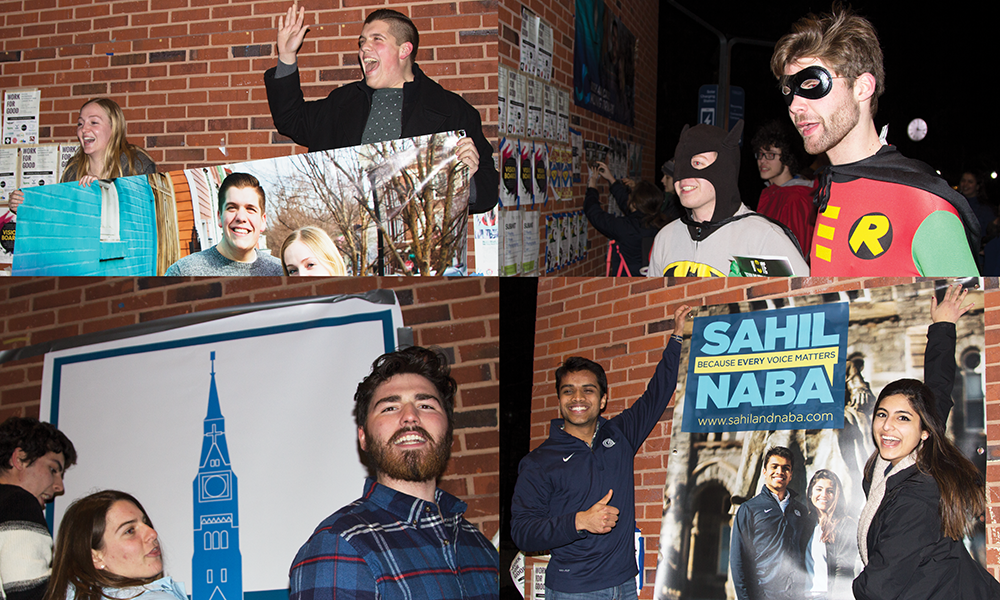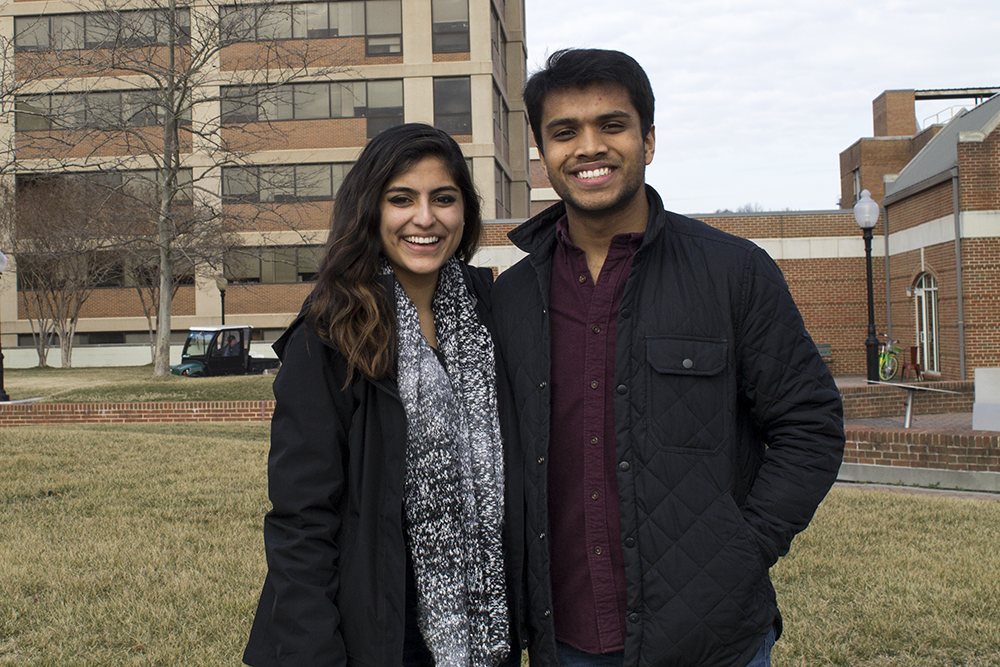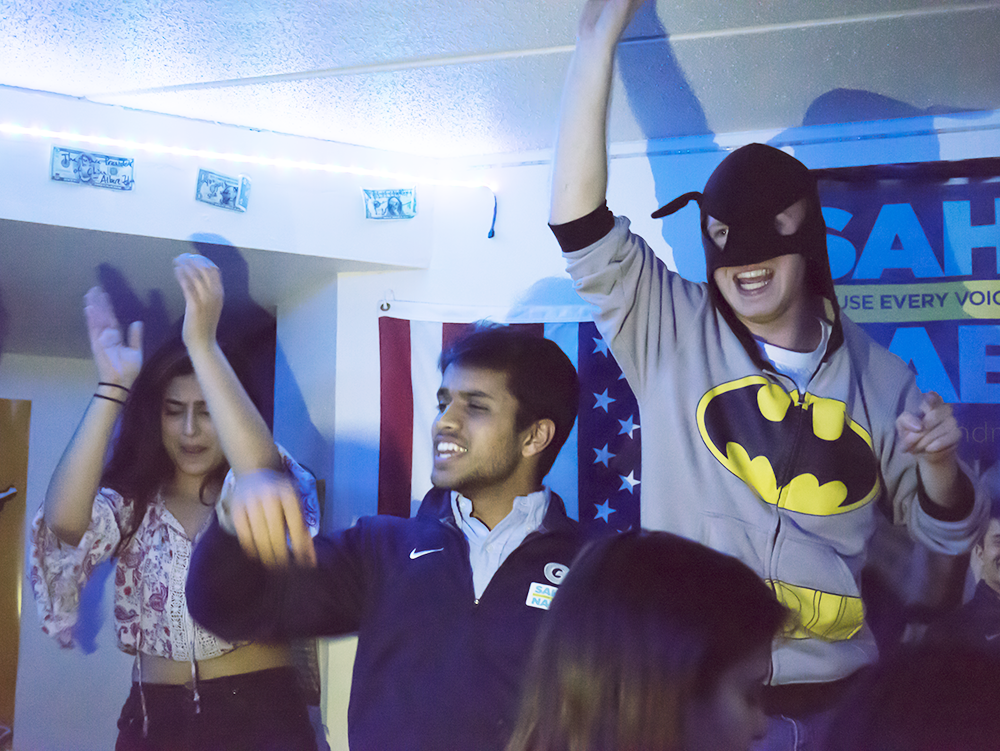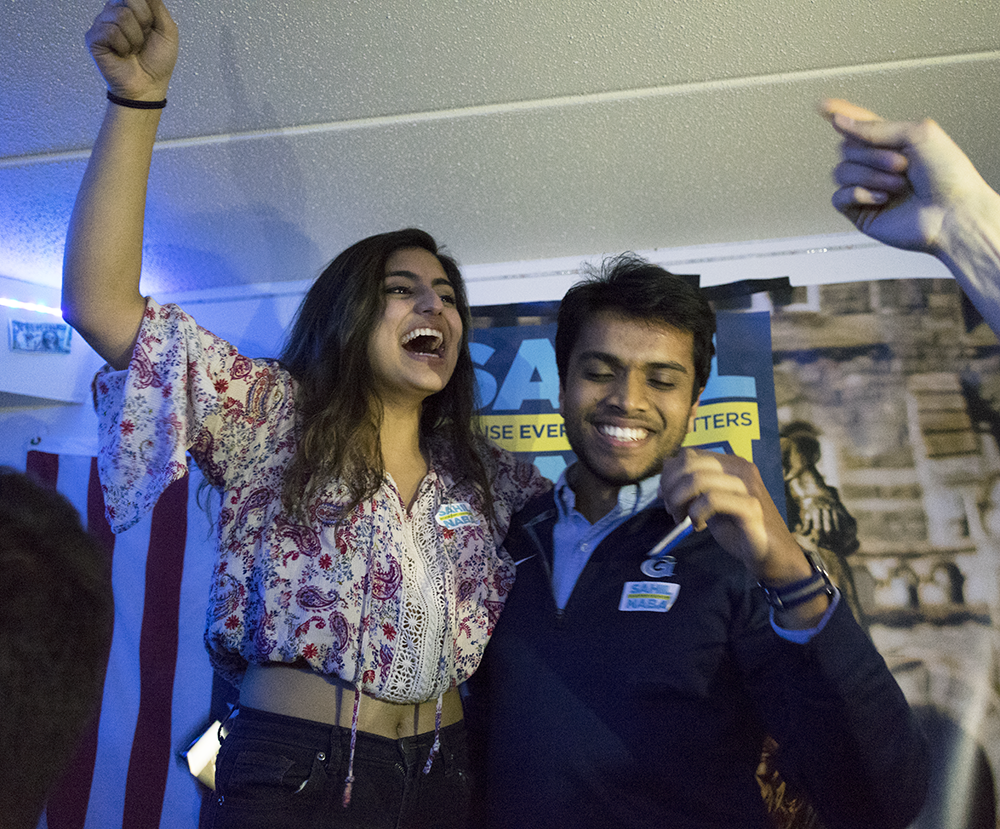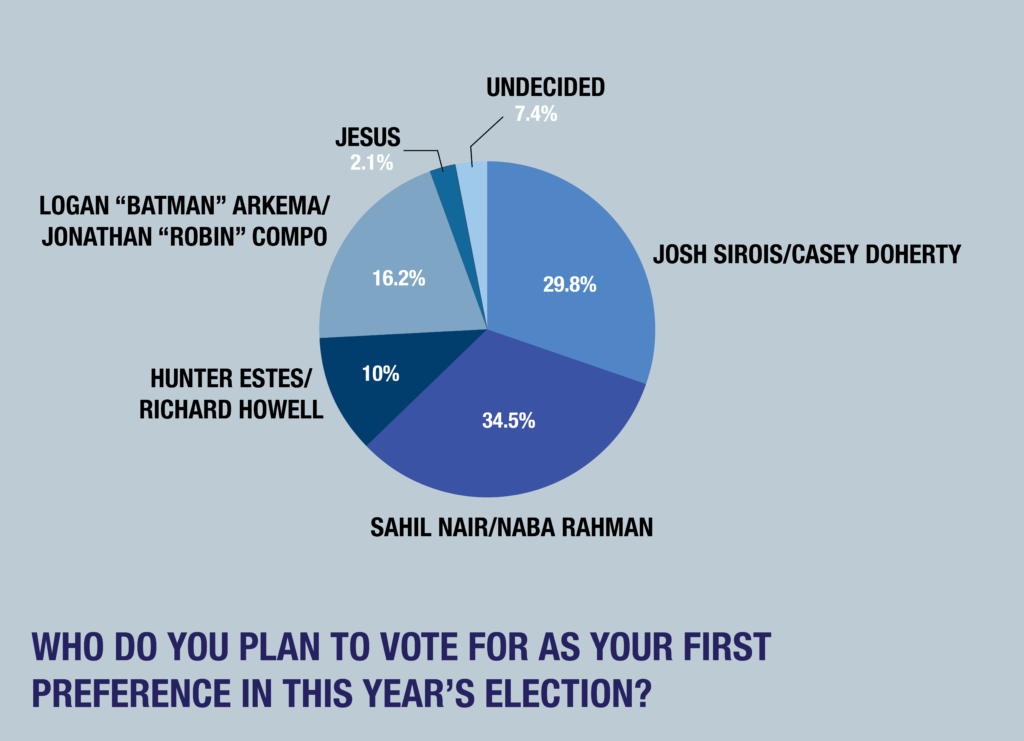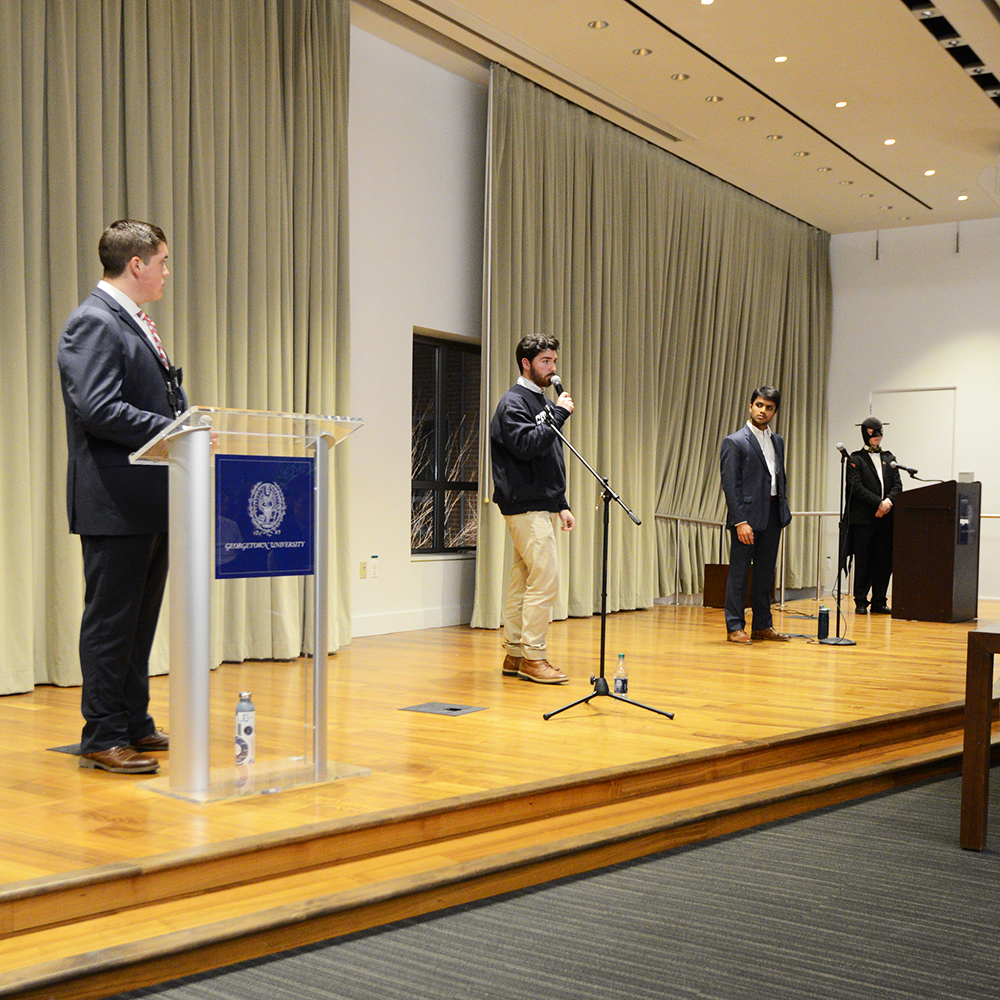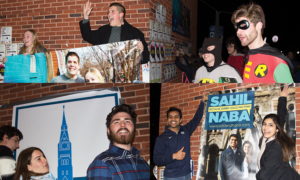
Four tickets launched their campaigns for the 2018 Georgetown University Student Association executive election early Thursday morning, previewing a season expected to focus on themes of affordability and inclusion.
The announced tickets are: Logan Arkema (COL ’20) and Jonathan Compo (COL ’20), Hunter Estes (SFS ’19) and Richard Howell (SFS ’19), Sahil Nair (SFS ’19) and Naba Rahman (SFS ’19), and Josh Sirois (SFS ’20) and Casey Doherty (COL ’20).
Per tradition, Estes and Howell, Nair and Rahman and Sirois and Doherty walked into Red Square just after midnight to mark the start of the official campaign period. Arkema and Compo arrived in Red Square later.
The tickets are joined by a fifth evidently satirical candidate, a member of the Georgetown Heckler satirical publication who launched an unofficial write-in campaign as Jesus with the running mate “You.”
Tickets can still join the race by collecting and submitting 100 student signatures to the GUSA Election Commission by Feb. 10. Election day is set for Feb. 22.
Arkema and Compo
Capes flowing in the wind and bat signals alight, Arkema and Compo ran through Red Square dressed as superhero duo Batman and Robin, calling for the replacement of the Georgetown University Police Department with vigilantes and renaming the second floor of Lauinger Library to “Arkham Asylum.” Their call for “pocket bat-signals for everyone” elicited cheers from the dwindling crowd.
Arkema is the Georgetown University College Democrats’ membership director and a GUSA senator for West Campus, which includes Southwest Quad. Arkema campaigned for his senate seat on a promise to conduct all GUSA business in the character and voice of the cartoon hero Batman, a persona he plans to maintain in the GUSA executive campaign.
Arkema was joined by his running mate Compo, technical director for Mask and Bauble Dramatic Society’s “Footloose” musical production this spring and a former cartoonist for The Hoya.
Donning a full Robin suit, Compo acted as a dutiful sidekick to his Batman counterpart. The two are running a satirical campaign, aimed at highlighting perceived faults in past and current GUSA campaigns.
“I believe we are trying to go for healthy and nuanced satire that overall improves Georgetown and GUSA,” Arkema said. “And we’re going to solve every single one of our problems that GUSA faces in costume, because we definitely believe that two individual people can completely change everything at Georgetown in a single year.”
Despite their satirical approach to the campaign, the superhero duo touted GUSA’s potential for achievement.
“GUSA can be effective if people focus on the issues, rather than themselves. I think if they take themselves a little less seriously, then maybe we can make student government a fun place to get s–t done,” Arkema said.
Estes and Howell
After leading supporters in a rendition of the university’s traditional fight song, “There Goes Old Georgetown,” Estes and Howell unveiled a platform distinct among the campaigns for its emphasis on community and values.
Estes served on the GUSA senate’s Finance and Appropriations Committee during his sophomore year and previously directed membership for Georgetown University College Republicans in 2016. Estes has also served as the head of the Georgetown chapter of the Knights of Columbus, the world’s largest Catholic service fraternal organization.
Howell is also a member of the Knights of Columbus and serves on the associate board of the Lecture Fund.
Estes and Howell’s campaign is built on three themes: cost, community and charity.
Estes said his and Howell’s personal experiences struggling to meet Georgetown’s tuition and living costs inspired the cost theme of their campaign.
“We’re both here on scholarships, we’re here on financial aid, I’m working two jobs just to support my time at Georgetown, and it’s becoming harder and harder to do that,” Estes said. “And so we want to approach ways to reduce fees, make campus more affordable and take a look at tuition and the tuition transparency process so we can have a real process with the administration.”
Estes and Howell’s second and third campaign themes, community and charity, stand out as priorities based in the student body’s culture rather than university policy. The community pillar reflects the candidates’ concern that today’s student body shares too few common experiences.
“The community used to be be built around the basketball team and that’s just not possible these days,” Estes said. “I just don’t think there’s enough communal experiences that we come out of Georgetown saying you know this is what binds us together.”
The final pillar of their campaign, charity, represents Estes and Howell’s hope to build a “culture of service” by promoting service projects on campus.
“This is a school that’s founded on the formation of the individual, building individuals to go out in the world and serve the world,” Estes said. “What we would like to see is potentially a service pledge, where all clubs seek to participate and at least once a year host a service project. I think that’s a great way to bring the resources Georgetown has to a larger community.”
Nair and Rahman
A group of supporters rallied around Nair and Rahman while they launched their campaign, which seeks to amplify student voices on campus and strengthen Georgetown’s existing resources. The pair intends to run on a platform of inclusivity, accountability and opportunity on campus.
Nair said those three tenets will guide them in their approach to the election and policy issues.
“We want to build a GUSA that is by Georgetown and for Georgetown, as opposed to by GUSA and for GUSA,” Nair said. “We want to amplify the voices of communities on this campus that aren’t represented within our student government right now.”
Nair is director of external outreach at Innovo Consulting, a group that connects social entrepreneurs and nonprofit organizations to Georgetown students. Rahman led Model United Nations’ National Collegiate Security Conference last semester and has been involved with Georgetown University Social Innovation and Public Service Fund, a $1.5 million student-run fund that allocates grant money to student and alumni social ventures.
Nair and Rahman would seek to promote student projects and ideas by connecting students with existing resources on campus and bolstering relationships between students and administrators. Rahman said she believes GUSA has untapped potential to support students in their pursuits.
“A lot of students out there have these big dreams and big goals and a lot of times they fall short. I think a lot of the reason is that they don’t have the support to get there,” Rahman said. “I think GUSA is an amazing institution that has the opportunity to reach those students, but right now it’s not really reaching out and serving the community there.”
It’s time to change the way things work, Rahman said.
“I think that this is an opportunity for us to shift the table. Right now, students have to come to GUSA for help and GUSA has to stand up and start going to them, asking what they want and what they need,” Rahman said.
GUSA’s election history of low voter turnout and lack of student engagement has motivated Nair to try to connect with a broader range of students across campus.
“We’re looking forward to getting Georgetown, as a community and as a school, excited about GUSA elections,” Nair said. “I have a good feel for this campus and I want to really reach out and bring people into these conversations and make this GUSA election the best election.”
Sirois and Doherty
Sirois and Doherty brought along a large throng of campaign staff and supporters, launching their campaign with a performance by campus a cappella group Georgetown Superfood, their first endorser.
Sirois and Doherty pitched themselves as a ticket of continuity; they plan to continue the work they, individually, and GUSA, broadly, began under the current administration.
“We really want to show that we’ve done a lot of work with the current GUSA executive, and we do see things that could be done better and we’re absolutely reflecting those in our platform that we’re not trying to revolutionize the system,” Sirois said in an interview with The Hoya. “We’re trying to take the progress that’s been made and make it more, make it better.”
Sirois is a GUSA senator who has served on the Finance and Appropriations Committee, the senate body that appropriates the Student Activities Fee to student groups, while Doherty has led GUSA’s “Dreamers” advocacy efforts on the Federal and D.C. Relations committee and is a coordinator for Georgetown Opportunities for Leadership Development.
Sirois cited his campaign’s commitment to advancing existing efforts within GUSA, including a previously unannounced initiative to establish a food pantry. They also proposed a new body within the GUSA executive, the Hoya Hotline, which would seek out and respond to student questions and concerns, including connecting students with existing resources.
Sirois and Doherty are focusing on three policy pillars: affordability and access, student empowerment, and health and wellness.
One of Sirois and Doherty’s potential vulnerabilities as candidates is their school year, as both are sophomores. The current GUSA president, Kamar Mack (COL ’19), was the only sophomore to run for the GUSA executive in 2017, while the 2016 and 2015 GUSA races included no sophomore candidates.
Sirois said the pair’s school year is not a weakness and said the ticket sees it as an “absolute advantage.”
“We know some other candidates are entering their senior year; we know some candidates are planning to spend their summers elsewhere. We both are committed to spending our summers here actively,” Sirois said. “We’re at the point in our careers in the student body where it makes sense. … In Georgetown’s student environment, leadership really doesn’t have to be just in our junior and senior years, and I think we can really prove that.”
The Road Ahead
The debates for vice presidential and presidential candidates will be held in Intercultural Center Room 115 on Feb. 14 and in the Healey Family Student Center’s Great Room on Feb. 19, respectively.
Tickets are barred from spending more than $300 on their campaigns. They are required to submit receipts of all campaign expenses by midnight on election day.
On election day, students can vote on the student organization portal Hoya Link or at a polling station operated by the GUSA Election Commission, expected to be located either in Red Square, weather permitting, or the Leavey Center.
In addition to the race for GUSA president and vice president, the February ballot will also include a referendum, approved by the GUSA senate Jan. 21, which proposes reforms to the senate’s current structure. The reforms include electing senators by class year rather than geographical district and holding elections for nonfreshman senators in the spring instead of in the fall.








